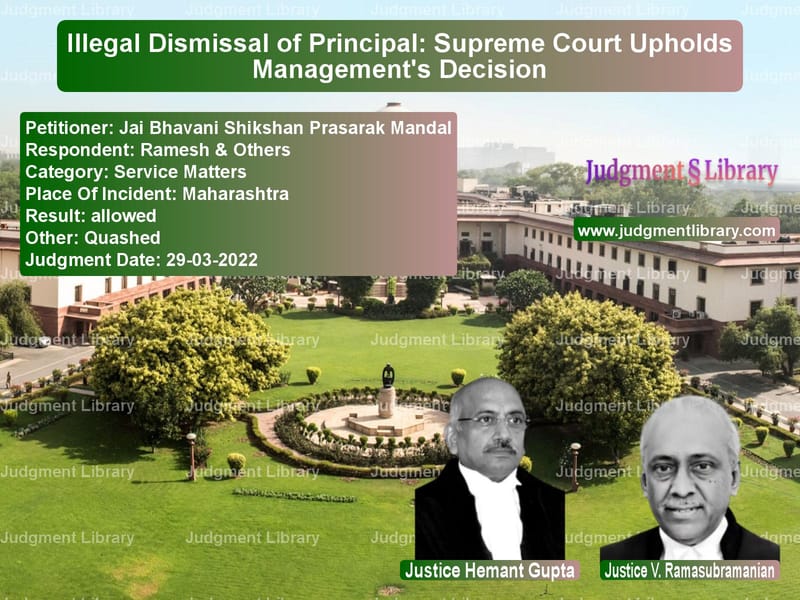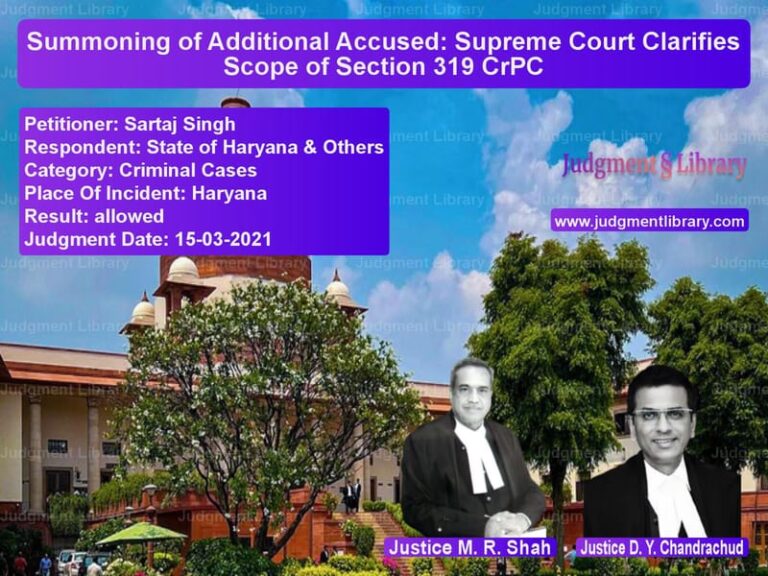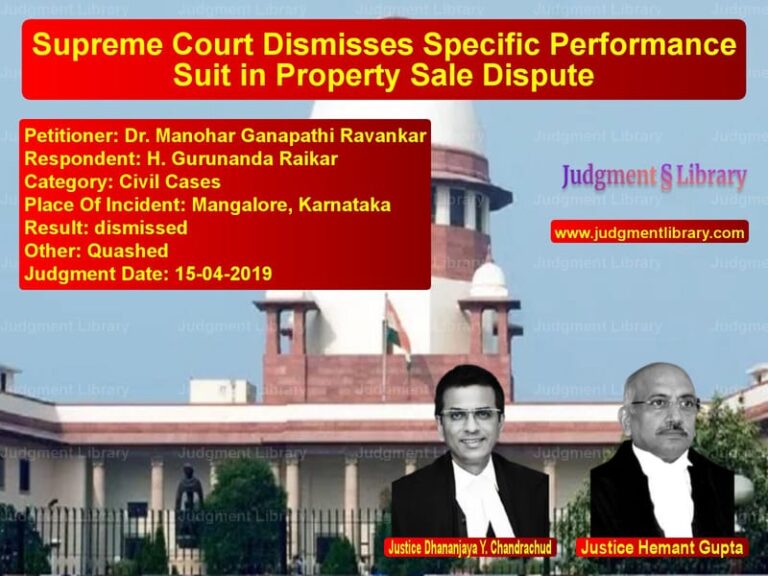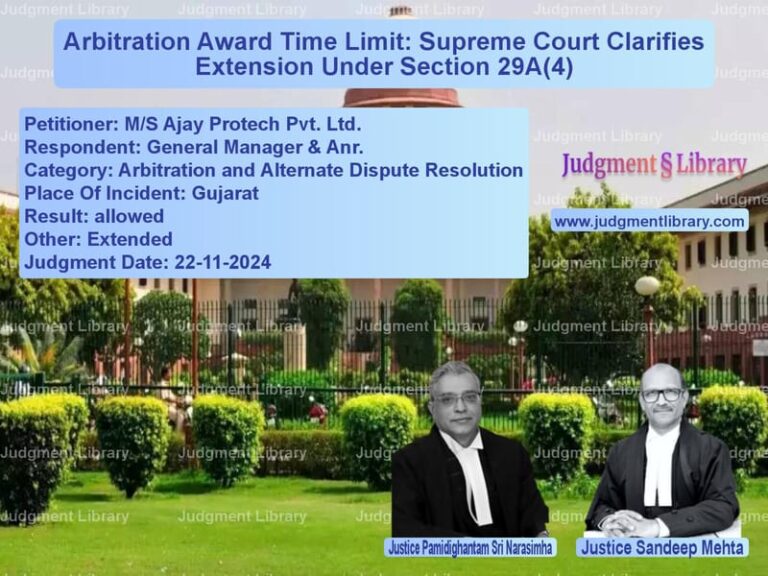Illegal Dismissal of Principal: Supreme Court Upholds Management’s Decision
The case of Jai Bhavani Shikshan Prasarak Mandal vs. Ramesh & Others revolves around the dismissal of a school principal and whether the disciplinary proceedings followed the due process under the Maharashtra Employees of Private Schools (Conditions of Service) Regulation Act, 1977. The Supreme Court’s ruling clarifies the requirements for disciplinary inquiries and highlights the doctrine of necessity in administrative proceedings.
The ruling is significant as it sets a precedent on how disciplinary actions should be conducted in educational institutions and provides clarity on the interpretation of the rules governing the composition of inquiry committees.
Background of the Case
The case concerns the removal of Ramesh, who was serving as the Principal of the Institute of Pharmacy under the management of Jai Bhavani Shikshan Prasarak Mandal. The institute, a registered educational society under the Bombay Public Trusts Act, initiated disciplinary proceedings against him in 2004 on allegations of serious misconduct.
Following an inquiry, seven out of ten charges were found to be proven, leading to his dismissal from service on August 19, 2004. Ramesh challenged his dismissal before the School Tribunal, which ruled in his favor, stating that the inquiry committee was not constituted as per Rule 36(2)(b) of the Maharashtra Employees of Private Schools (MEPS) Rules, 1981.
The School Tribunal’s decision was later upheld by the Bombay High Court, leading the educational society to appeal before the Supreme Court.
Legal Issues Considered
- Whether the inquiry committee was properly constituted as per Rule 36(2)(b) of the MEPS Rules.
- Whether the non-inclusion of the President of the Management in the inquiry committee invalidated the disciplinary proceedings.
- The applicability of the doctrine of necessity when an inquiry committee member is unavailable.
- Whether the High Court erred in applying the precedent set by National Education Society vs. Mahendra Baburao Jamkar.
Petitioner’s Arguments (Jai Bhavani Shikshan Prasarak Mandal)
- The management argued that the disciplinary proceedings followed all required procedural steps, including giving the respondent a fair opportunity to defend himself.
- The inquiry committee was initially constituted with the President of the Management, but he had to step down due to health issues. In his absence, another member was assigned the role.
- The School Tribunal and the High Court failed to consider the doctrine of necessity, which allows for reasonable substitutions in inquiry proceedings.
- The High Court erred in its reliance on National Education Society vs. Mahendra Baburao Jamkar, as that case involved different circumstances.
Respondent’s Arguments (Ramesh)
- The removal of the principal was invalid as the inquiry committee was not properly constituted according to Rule 36(2)(b).
- The absence of the President of the Management from the committee made the entire process illegal.
- The Tribunal and the High Court correctly ruled in favor of the respondent, ensuring that statutory safeguards under the MEPS Rules were upheld.
Supreme Court’s Judgment
The Supreme Court bench, comprising Justices Hemant Gupta and V. Ramasubramanian, ruled in favor of the petitioner and set aside the decisions of the School Tribunal and the High Court. The Court made several key observations:
1. Doctrine of Necessity Applies
“Once it is admitted that the disciplinary proceedings commenced with an Inquiry Committee of which the President was a member, and that subsequently he was replaced by someone due to ill health, the doctrine of necessity would come into play.”
The Court ruled that since the President could not continue due to health issues, the substitution was valid.
2. The High Court Erred in Applying National Education Society Case
“The interpretation given by the Full Bench of the High Court in National Education Society case, under Rule 36(2)(b) may not be correct.”
The Supreme Court clarified that the requirement for the President’s presence does not apply when unforeseen circumstances prevent participation.
3. Inquiry Committee Was Properly Constituted
“The School Tribunal as well as the High Court failed to take note of the very pleadings of the first respondent with regard to the circumstances in which the President of the Society could not continue as part of the Inquiry Committee.”
The Court concluded that the proceedings were conducted fairly and within the legal framework.
Key Takeaways from the Judgment
- The doctrine of necessity allows reasonable modifications in committee composition if a key member is unable to serve.
- The requirement of the President’s presence in an inquiry committee under Rule 36(2)(b) is not absolute.
- The Supreme Court reaffirmed that disciplinary proceedings must be fair but should not be invalidated due to unavoidable substitutions.
- Educational institutions have the right to take disciplinary action as long as procedural fairness is ensured.
Implications of the Verdict
This ruling has significant implications for educational institutions and their ability to conduct disciplinary proceedings:
- Educational managements can proceed with disciplinary actions even if a committee member has to be replaced due to genuine reasons.
- The judgment provides clarity on how Rule 36(2)(b) should be interpreted, preventing unnecessary delays in disciplinary processes.
- Courts will now consider practical constraints rather than invalidating entire proceedings based on rigid technicalities.
Ultimately, this Supreme Court ruling ensures that disciplinary actions in educational institutions remain fair, reasonable, and legally sound.
Petitioner Name: Jai Bhavani Shikshan Prasarak Mandal.Respondent Name: Ramesh & Others.Judgment By: Justice Hemant Gupta, Justice V. Ramasubramanian.Place Of Incident: Maharashtra.Judgment Date: 29-03-2022.
Don’t miss out on the full details! Download the complete judgment in PDF format below and gain valuable insights instantly!
Download Judgment: jai-bhavani-shikshan-vs-ramesh-&-others-supreme-court-of-india-judgment-dated-29-03-2022.pdf
Directly Download Judgment: Directly download this Judgment
See all petitions in Employment Disputes
See all petitions in Disciplinary Proceedings
See all petitions in Termination Cases
See all petitions in Judgment by Hemant Gupta
See all petitions in Judgment by V. Ramasubramanian
See all petitions in allowed
See all petitions in Quashed
See all petitions in supreme court of India judgments March 2022
See all petitions in 2022 judgments
See all posts in Service Matters Category
See all allowed petitions in Service Matters Category
See all Dismissed petitions in Service Matters Category
See all partially allowed petitions in Service Matters Category







